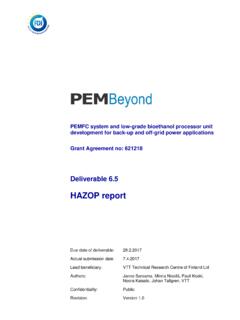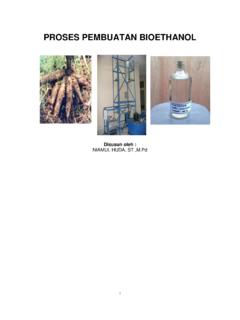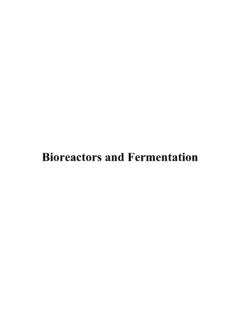Transcription of Overview of UK B iofuel Producers - GOV.UK
1 Overview of UK Biofuel Producers - Input to Post-Implementation Review ECOFYS UK Ltd. | 1 Alie Street | London E1 8DE | T +44 (0)20 74230-970 | F +44 (0)20 74230-971 | E | I Company No. 4180444 Overview of UK Biofuel Producers - Input to Post-Implementation Review By: Sacha Alberici, Gemma Toop Date: 27 March 2014 Project number: BIOUK10553 Ecofys 2014 by order of: Department for Transport (DfT) ECOFYS UK Ltd. | 1 Alie Street | London E1 8DE | T +44 (0)20 74230-970 | F +44 (0)20 74230-971 | E | I Company No. 4180444 Table of contents 1 Introduction 1 2 UK biofuel producer Overview 2 Commercial scale UK biofuel production plants 2 UK biodiesel capacity and production 6 UK bioethanol capacity and production 7 Overview of smaller UK biofuel plants 8 Employment and investment in the UK biofuel sector 10 3 Challenges faced by UK biofuel Producers 11 Level of support for biofuels under the RTFO 11 Duty differential 11 RTFC pricing 11 Total support for biofuels under the RTFO 13 Issuance of RTFCs and cash flow implications 15 Process of issuing RTFCs 15 Verification cost 15 Cash flow implications 16 Other challenges facing biofuel Producers 17 Impact on smaller biofuel Producers 17 Case studies of small UK biofuel Producers 19 4 Industry recommendations
2 For improvement of RTFO 22 5 Observations and conclusions 26 6 Stakeholders who provided input 28 BIOUK10553 Final version 1 1 Introduction The Renewable Transport Fuel Obligation (RTFO) was introduced in April 2008 as the UK s primary mechanism to incentivise sustainable biofuel use in road transport fuel. For the first time anywhere in the world, legislative support for biofuel was coupled to reporting on the carbon and sustainability performance of the biofuel used. Since the introduction of the RTFO, the biofuels industry globally has grown significantly and the dynamics of the market are constantly evolving. In Europe, the legislative landscape has also witnessed a step-change. The EU introduced a target for all Member States to achieve 10% renewable energy in their road transport sectors by 2020, contingent on any biofuels counted towards the target meeting mandatory carbon and sustainability criteria.
3 The mandatory criteria are designed to prevent direct land use change from feedstock production and ensure that biofuels used save a significant level of greenhouse gas (GHG) emissions compared to the fossil equivalent. The biofuels industry has stepped up to the challenge of demonstrating the sustainability of their feedstocks and a range of voluntary schemes has grown to support the claims made. Now the sustainability discussion has moved on to limitation of indirect effects from increasing biofuels production, with a proposal from the European Commission in 2012 to limit first generation biofuels and further incentivise advanced biofuels and biofuels from wastes and residues which is still the subject of intense negotiations. Throughout the lifetime of the RTFO the biofuels industry in the UK has witnessed a rollercoaster ride.
4 The UK biofuel industry has grown from almost nothing in 2005 to an industry with a capacity to produce over billion litres today. However, the actual production has varied significantly over this time, with utilisation levels generally running at less than 50% across the industry. Furthermore, the number of companies actively reporting to the Department for Transport (DfT) has decreased. To understand the underlying dynamics and challenges and to identify possible solutions, Ecofys supports DfT by taking stock of the biofuel production industry in the UK today, providing an Overview of the industry in the UK and the key Producers , along with insights into the challenges the industry faces, particularly focusing on smaller biofuel Producers . We have interviewed a range of biofuel Producers , representing the different types of biofuel and provide an Overview of their recommendations to the DfT for improving the RTFO.
5 This report, together with the industry recommendations, feeds into DfT s 2014 Post-implementation review of the RTFO. BIOUK10553 Final version 2 2 UK biofuel producer Overview This Section includes an Overview of known biofuel production plants in the UK and an estimate of employment in the sector. The Overview of production plants covers large-scale biodiesel, bioethanol and biomethane plants and smaller biofuel Producers , who are almost exclusively producing biodiesel from used cooking oil. Commercial scale UK biofuel production plants The UK has a total biofuel production capacity of over 1,500 million litres per year. Figure 1 and Table 1 show the larger scale commercial biofuel plants in the UK, indicating both operational and (known) planned plants. The development in total larger-scale commercial biodiesel and bioethanol production capacity in the UK since the first plant opened in 2005 is shown in Figure 2, followed by a brief description of each of the operational plants.
6 Figure 1: Operational and planned larger scale commercial biofuel production plants. BIOUK10553 Final version 0 Table 1: UK larger-scale commercial biofuel plants (operational and planned) Company Location Year of operation Investment ( million) Owners Jobs Capacity (million litres) Fuel type Current feedstock mix Operational plants Argent Energy Motherwell, Scotland 2005 Swire & Son 70 60 Biodiesel UCO, tallow, sewage grease Harvest Energy (formerly Biofuel Corporation) Seal Sands, Teesside 2006 250 Blue Ocean Group 50 284 Biodiesel Primarily waste oils British Sugar Wissington, Norfolk 2007 - British Sugar 30 70 bioethanol Sugar beet Convert 2 Green Middlewich, Cheshire 2007 - Various 60 20 Biodiesel UCO Greenergy Immingham, Hull 2007 50 - 56 220 Biodiesel Waste oils Gasrec Aldbury, Surrey 2008 - MEZ Energy main investor 21 5 Bio-LBM1 Municipal Solid Waste Ennovor Bromborough 2010 - - 45 57 Biodiesel Waste oils Crop Energies (formerly Ensus) Wilton, Teesside 2010 310 Crop Energies AG 100 400 bioethanol Wheat Olleco (formerly Agri Energy)
7 Bootle, Merseyside 2012 - Olleco 4502 16 Biodiesel UCO Vivergo Immingham, Hull 2013 350 AB Sugar, BP, DuPont 80 420 bioethanol Wheat Planned plants INEOS Bio Seal Sands, Teesside 2016 - INEOS Bio - 30 bioethanol Municipal Solid Waste 1 Gasrec produce Liquefied Biomethane (Bio-LBM), which is then blended with Liquid Natural Gas (LNG) to make Bio-LNG. 2 400 of which involved in the collection and processing of UCO. Source: Personal communication with Adam Baisley, Olleco Commercial Director. BIOUK10553 Final version 0 Figure 2 charts the development of larger scale biofuel capacity in the UK since 2005. Biodiesel production capacity is seen to dominate the initial period with the commissioning of the Argent Energy (2005), Harvest Energy (2006), Convert2 Green and Greenergy (2007) plants.
8 No further larger scale biodiesel plants were commissioned until 2010 when the Ennovor plant came on stream, followed by the Olleco plant in 2012. bioethanol projects have been slower to develop with the UK s first bioethanol plant being commissioned by British Sugar in 2007. This plant remained the UK s only bioethanol plant for three years. It has since been complemented by two very large bioethanol plants (Ensus in 2010 and Vivergo in 2013), significantly increasing the overall bioethanol capacity in the UK. As such, the picture today, and looking ahead to 2016, is that bioethanol capacity represents the larger share on a volume basis, although the shares are broadly similar if expressed on an energy basis. Figure 2: Cumulative production capacity of commercial scale UK bioethanol and biodiesel plants (operational and planned).
9 Figure excludes biomethane production as the capacity is still small relative to the total. Actual biofuel production has been significantly lower than the total capacity over this period. There are several reasons for this, including a lower than anticipated market demand as a consequence of reduced blending obligations, competition from bioethanol and biodiesel imports from outside the EU, over-capacity of biodiesel production in general in Europe and high feedstock prices. In reaction to unfavourable market conditions, several facilities including Ensus (bought by Crop Energies AG) and Biofuel Corporation (bought by Harvest Energy) saw temporary closures. See sections and for further information. An Overview of the largest operational commercial scale biofuel plants follows.
10 02004006008001,0001,2001,4001,6002005 2006 2007 2008 2009 2010 2011 2012 2013 2014 2015 2016million litresBioethanolBiodiesel BIOUK10553 Final version 1 Argent Energy3, 4 Argent Energy commissioned the UK s first commercial scale biofuel plant in 2005, located in Motherwell, Scotland. The plant has a current production capacity of 60 million litres of biodiesel (around 52 ktonne) and uses tallow, Used Cooking Oil (UCO) and sewage grease as feedstocks. The plant was set up with an initial capital investment of around 17 million. In 2009, a further million was invested, supported by a grant from the Scottish Government, to build a feedstock pre-processing facility. This enables Argent to remove impurities from the feedstocks prior to use at the plant, so that more locally produced waste oils can be used.


















